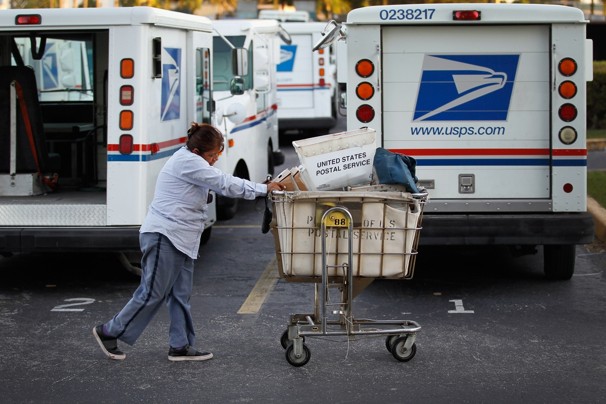
(Joe Raedle - Getty Images)
Congress moved one step closer Wednesday to overhauling the cash-strapped U.S. Postal Service by approving sweeping reforms to rebalance the mail agency’s finances and help cut the size of its delivery network.
The bipartisan measure passed 62 to 37 and would give the Postal Service nearly $11 billion to offer buyouts and early retirement incentives to hundreds of thousands of postal workers and to pay off its debts. Revised estimates on how much USPS owes to federal worker pension accounts have determined that the agency has overpaid its obligations to the fund over several years.
The measure also would permit the end of Saturday mail deliveries in two years, only after USPS determines it is financially necessary. The Postal Service also could move forward with plans to shutter thousands of post offices and hundreds of mail distribution centers — but senators placed several restrictions on when, where and how outposts in rural communities could be closed.
The bill also modifies mail service standards to ensure that the Postal Service preserves the overnight delivery of mail sent to nearby communities, but allows USPS to slow the delivery of mail destined for destinations farther away.
The Postal Service has warned for years that it is on the verge of financial collapse and can no longer sustain operating a delivery network that still processes 554 million pieces of mail a day. It hopes to cut more than $22 billion in costs by 2015 as the popularity of snail mail declines. Letter carriers delivered just 168 billion pieces of mail last year, down from 202.8 billion delivered a decade ago, according to postal figures.
Senators have worked for more than a year to give USPS the ability to set postage rates and delivery schedules and to determine the fate of unprofitable post offices free of congressional intervention, but senators eager to protect home-state interests added several restrictions. They agreed to strengthen the appeals process for customers opposed to closing a post office; to force USPS to wait until after Election Day to close postal facilities in states that permit voting by mail; and to permit the Postal Service to co-locate post offices in government-owned buildings to save space and money.
Senators also approved a plan that forbids the Postal Service from closing a rural post office unless the next-nearest location is no more than 10 miles away.
Senate Majority Leader Harry M. Reid (D-Nev.) called the bill’s passage a “very important day for the American people,” and praised senators for considering 39 amendments over two days in a seamless bipartisan fashion.
“It’s going to be something that will send the House a message — that we can do big things,” Reid said.
But Rep. Darrell Issa (R-Calif.), lead sponsor of a competing postal reform measure in the House, called the Senate bill “wholly unacceptable” because it delays the Postal Service’s ability to quickly close unprofitable post offices and processing centers.
“While the Postal Service is actually trying to shutter some facilities it does not need, the bill forces the Postal Service to keep over one hundred excess postal facilities open at a cost of $900 million a year,” Issa said.
Issa’s bill, which has yet to be scheduled for a vote in the House, allows USPS to end Saturday mail deliveries, streamline postage rates and require postal workers to pay the same health insurance premiums as federal employees. It also establishes a financial control board to overhaul postal finances and a separate commission inspired to recommend which postal facilities should close.
Business groups that rely on the mail remain hopeful that Congress will strike a deal before May 15, when the Postal Service plans to resume closing post offices and processing facilities.
“I’m surprised the Senate is moving a postal bill in an election year, and pleased they’re getting the ball rolling,” said Tony Conway, head of the Alliance of Nonprofit Mailers. His group supports efforts to end Saturday mail delivery and to close post offices and processing plants.